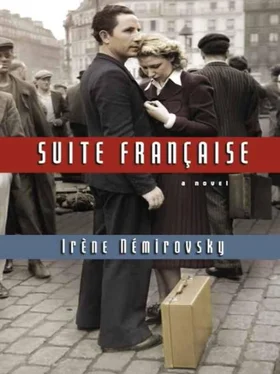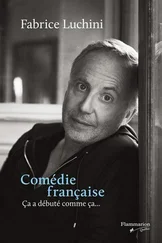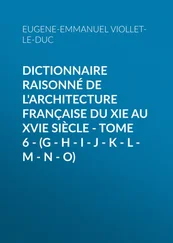Irène Némirovsky - Suite Française
Здесь есть возможность читать онлайн «Irène Némirovsky - Suite Française» весь текст электронной книги совершенно бесплатно (целиком полную версию без сокращений). В некоторых случаях можно слушать аудио, скачать через торрент в формате fb2 и присутствует краткое содержание. Жанр: Историческая проза, на английском языке. Описание произведения, (предисловие) а так же отзывы посетителей доступны на портале библиотеки ЛибКат.
- Название:Suite Française
- Автор:
- Жанр:
- Год:неизвестен
- ISBN:нет данных
- Рейтинг книги:4 / 5. Голосов: 1
-
Избранное:Добавить в избранное
- Отзывы:
-
Ваша оценка:
- 80
- 1
- 2
- 3
- 4
- 5
Suite Française: краткое содержание, описание и аннотация
Предлагаем к чтению аннотацию, описание, краткое содержание или предисловие (зависит от того, что написал сам автор книги «Suite Française»). Если вы не нашли необходимую информацию о книге — напишите в комментариях, мы постараемся отыскать её.
"A book of exceptional literary quality… it has the kind of intimacy found in the diary of Anne Frank."-The Times Literary Supplement
"Heroic… a novel about a nightmare in which the author is entirely embedded."-ANITA BROOKNER, The Spectator
"An exceptionally forceful and frank testimony… a real find. A masterpiece."-L'Express
"Remarkable as the story of the publication of Suite Française is, it will finally be of anecdotal interest compared with the importance of the book. Here is the work of a fine novelist at the top of her form, writing about the fate of her adopted country with a pitiless clarity."-Evening Standard
Suite Française — читать онлайн бесплатно полную книгу (весь текст) целиком
Ниже представлен текст книги, разбитый по страницам. Система сохранения места последней прочитанной страницы, позволяет с удобством читать онлайн бесплатно книгу «Suite Française», без необходимости каждый раз заново искать на чём Вы остановились. Поставьте закладку, и сможете в любой момент перейти на страницу, на которой закончили чтение.
Интервал:
Закладка:
"Yes, I bequeath all my worldly goods and possessions to Adrien Péricand, with instructions for him to deposit immediately and without delay five million to the charitable institution I founded, known as the Penitent Children of the 16th Arrondissement. This institution is instructed to commission an excellent artist to paint a life-size portrait of me on my deathbed, or to sculpt a bust that is a good likeness of me, and to place it in the entrance hall of the aforementioned establishment. To my dearly beloved sister Adèle-Emilienne-Louise, to compensate her for the feud caused by the inheritance left me by our venerable mother, Henriette Maltête, I do bequeath as hers and hers alone the property I own in Dunkerque bought in 1912 with all its existing buildings and that portion of the docks which also belongs to me. I entrust my son with the responsibility of carrying out this wish. I desire that my château in Bléoville, in the Vorhange region in Calvados, be turned into a home for former soldiers severely wounded in the war, preferably for those who have been paralysed or have suffered mental breakdowns. I desire that a simple plaque be displayed on the wall inscribed with the words 'Péricand-Maltête Charitable Institution, in memory of his two sons killed in Champagne.' When the war is over…"
"I think… I think it is over," Maître Charboeuf shyly interjected.
But he didn't realise that Monsieur Péricand was thinking about the last war, the one that had taken two sons from him and tripled his fortune. He was back in September 1918, just after their victory, when he had nearly died of a bout of pneumonia and when, in the presence of his family gathered at his bedside (all the relatives from the north and south had rushed to be there when they heard the news), he had performed what turned out to be a rehearsal of his death: he had dictated his last wishes then and they had remained intact within him until now, when he could give them life.
"When the war is over, I wish a monument to be built to honour the dead for which I bequeath the sum of three thousand francs to be taken from my estate and to be erected on the town square in Bléoville. At the top, in large gold letters, the names of my two oldest sons, then a space, then…" he closed his eyes, exhausted, "… then all the other names in small letters…"
He was silent for such a long time that the notary looked anxiously at the Sisters. Was he…? Was it all over already? But Sister Marie of the Chérubins calmly shook her head. He wasn't dead yet. He was thinking. In his motionless body, his memory was travelling through immense spans of time and space: "Almost all of my fortune is tied up in American stocks and bonds, which I was advised would be a good investment. I don't believe it any more." He shook his beard mournfully. "I don't believe it any more. I wish my son to convert them immediately into French francs. There is also some gold, but it's not worth keeping. It should be sold. A copy of my portrait should also be placed in the château in Bléoville in the downstairs ballroom. I bequeath to my faithful valet an annual income of one thousand francs for the rest of his life. As for my future greatgrandchildren, I wish their parents to name the boys Louis-Auguste and the girls Louise-Augustine after me."
"Is that everything?" Maître Charboeuf asked.
He bowed his long beard, indicating yes, that was everything. For a few moments that seemed brief to the notary, the witnesses and the Sisters, but to him were as long as a century, as long as delirium, as long as a dream, Monsieur Péricand-Maltête moved back in time to recall the life he had been given on this earth: the family dinners, the Boulevard Delessert, naps in the drawing room, Albert the cat on his lap; the last time he saw his older brother when they had parted vowing never to have anything more to do with each other (and he had secretly bought back the shares in that deal). Jeanne, his wife in Bléoville, hunched up with rheumatism, lying on a cane chaise longue in the garden, holding a paper fan (she died a week later), and Jeanne, in Bléoville, thirty-five years earlier, just after their wedding, when some bees had come in through the open window and were gathering pollen from the lilies in her bridal bouquet and the garland of orange blossom thrown at the foot of the bed. Jeanne had rushed into his arms, laughing, so he could protect her…
Then he was certain he could feel death approaching. He made a startled little gesture (as if he was trying to get through a door that was too narrow for him, saying, "No, please, after you") and a look of surprise appeared on his face. "Is this what it is?" he seemed to say. "So this is death, then?" The surprise on his face faded and he looked stern, solemn.
Maître Charboeuf wrote very quickly, "… When the Testator was handed the pen to affix his signature to this Last Will and Testament, he tried to lift his head, but could not, and immediately breathed his last, in the presence of the notary and the witnesses, who nevertheless, after reading the document, signed their names to render the document legal."
24
Jean-Marie, meanwhile, was starting to come round. He had drifted in and out of sleep for four days, semi-conscious and feverish. It was only today he felt a bit stronger. A doctor had been able to come the night before to change the dressing; his temperature had dropped. From where he was lying on the bed, he could see a large, dark kitchen, the white hat on an old woman who was sitting in the corner, beautifully shiny pots on the wall and a calendar depicting a chubby-cheeked French soldier hugging two young women from Alsace, a souvenir of the previous war. It was strange to see how the memories of the last war were still so alive in this house. Four pictures of men in uniform had pride of place: a small tricolour ribbon and a crêpe rosetta were pinned up in a corner; and next to him, to keep him from getting bored during the long hours of his convalescence, was a collection of the 1914-18 editions of L'Illustration bound in green and black.
He kept overhearing the same phrases in the conversations around him: " Verdun, Charleroi, the Marne…," "During the other war…," "When I was part of the occupying forces in Mulhouse…" They hardly spoke about the present war, their defeat. It was something they couldn't quite believe yet. Something that would only become a living, horrible reality a few months later, perhaps a few years later, perhaps not until these little boys with dirty faces that Jean-Marie could see peering over the wooden gate in front of the door grew into men. Wearing torn straw hats, their cheeks rosy or dark-skinned, holding long green sticks, frightened, curious, they stood on tip-toes to make themselves tall enough to see the wounded soldier inside, and when Jean-Marie moved they disappeared, like frogs jumping into the water. Sometimes the open gate let in a chicken, a ferocious old dog, an enormous turkey. Jean-Marie only saw his hosts at mealtimes. During the day, the old woman in the white hat tended to him. In the evening, two young women would sit with him. One was called Cécile, the other Madeleine. For a long time he thought they were sisters. But no. Cécile was the farmer's daughter and Madeleine was a foster-child. Both of them were attractive, not beautiful but fresh-faced. Cécile had a round red face and lively brown eyes; Madeleine was more delicate, a blonde with bright cheeks, smooth as satin and pink as apple blossom.
From the young women he learned what had happened that week. As they spoke about it, in their slightly harsh accent, all those terribly serious events lost their tragic element. "It's really sad," they would say and, "It's not very nice to see things like that"… "Oh, Monsieur! It's really upsetting!" He wondered if all the people here spoke like them, or whether it was something much deeper, rooted in the very souls of these girls, in their youth, some instinct that told them that wars end and invaders leave, that even when distorted, even when mutilated, life goes on. His own mother, knitting while the soup was cooking, would sigh and say, "Nineteen-fourteen? That's the year your father and I got married. We were miserable by the end of it, but very happy at the beginning." Even that bleak year was sweetened, bathed in the reflection of their love.
Читать дальшеИнтервал:
Закладка:
Похожие книги на «Suite Française»
Представляем Вашему вниманию похожие книги на «Suite Française» списком для выбора. Мы отобрали схожую по названию и смыслу литературу в надежде предоставить читателям больше вариантов отыскать новые, интересные, ещё непрочитанные произведения.
Обсуждение, отзывы о книге «Suite Française» и просто собственные мнения читателей. Оставьте ваши комментарии, напишите, что Вы думаете о произведении, его смысле или главных героях. Укажите что конкретно понравилось, а что нет, и почему Вы так считаете.

![Константин Бальмонт - Константин Бальмонт и поэзия французского языка/Konstantin Balmont et la poésie de langue française [билингва ru-fr]](/books/60875/konstantin-balmont-konstantin-balmont-i-poeziya-francuzskogo-yazyka-konstantin-balmont-et-thumb.webp)










